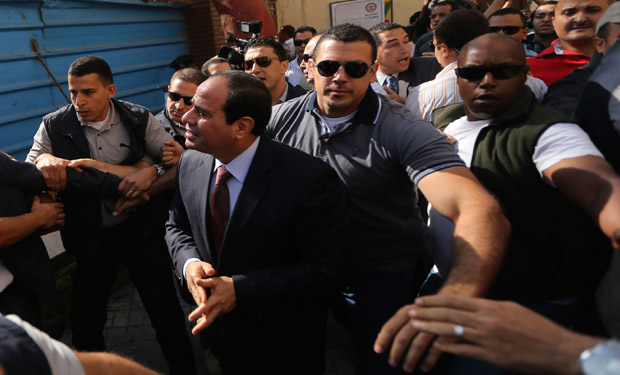Security issues affect the economy, and the build-up of interrelated problems means President Abdel-Fattah El-Sisi must work on a variety of issues simultaneously. All issues are equally critical and pressing, especially in the minds of the Egyptian people. In past meetings and media interviews, Sisi has already stated that he will not focus on one issue at the expense of another: he does not have the luxury of doing so. Instead, he will have to give all issues equal weight, given the general state of decline and the wide range of problems facing the Egyptian state. These problems include both domestic and foreign issues, such as the economy, security, education, health and transportation.
I believe that, for the aforementioned reasons, President Sisi will be compelled to address all matters simultaneously. For one, foreign policy issues are very important. The decline in Egypt’s regional and international role has come over many long years. No work has been done to rebuild Egypt’s foreign relations or to restore Egypt to the role and status it enjoyed well over a decade ago—that is, before the last decade of Mubarak’s rule. Since the 2011 revolution, we have been suffering from strategic problems in our foreign relations, compounded by the lack of interest in deepening our strategic relations in Africa as well as in the Middle East. This is because Egypt remained under the control of the United States, due to our distinct strategic relationship with America. This relationship formed the basis of all of our other strategic relations.
In my view, Egypt must first work on diversifying our strategic relations abroad. I believe that Sisi has worked on this since his time as defense minister, opening relations with Russia and China. He did not do so in order to replace our relations with America, because our relationship with the United States is important. He did so in order to expand our major strategic relations, which are linked to Egypt’s strategic interests and national security.
There is no doubt that Egypt has neglected relations with Africa, as well as its role as a leader among other Arab and Middle Eastern countries. This has given rise to problems that affect the lives of Egyptians. One of these is the problem of the Grand Ethiopian Renaissance Dam and the water issue. I think that this problem is a logical reaction, which reveals that Egypt has been lagging in its strategic relations with Africa in the past decades.
For these reasons, I believe that foreign policy issues are very critical and that the president must address them immediately. Moreover, foreign policy has a direct impact on domestic affairs. In order to solve domestic issues, then, foreign policy issues must be addressed at the same time. Much of what fuels our hopes lies in domestic projects, such as the Desert Development Corridor national project, construction in the Sinai, and the development of the Suez canal. All of this depends on international cooperation and assistance. Though it would seems that these projects are mostly related to foreign affairs, they still have an impact on domestic affairs, as well as economic and security issues.
For example, in order for Egypt to succeed in the fight against terrorism, it cannot just implement internal measures: it is necessary for the country to be open to regional cooperation. This regional cooperation must be organized with countries that share Egypt’s vision on combatting terrorism, as terrorist organizations have an international scope. The fight against terrorism has several dimensions. The first dimension is legislative. Anyone familiar with this issue knows well that Egyptian criminal law is not strong enough in terms of fighting terrorism. Laws must address terrorism in more detail, and perhaps a new law to combat terrorism could be enacted. Other laws connected to this law could be made as well—for example the criminalization of money laundering, which is used to finance terrorism.
A facet of the security issue is linked to strengthening the capacity of security apparatuses, especially after these last four years, during which police forces’ headquarters and abilities were weakened. Aid should be given in helping the police recover and enhance their capacity. There are also streams of intellectual thought linked to the renewal of religious discourse. In all of Sisi’s speeches, there has been a focus on intellectual revitalization, as well as integration of the youth, who represent about 60 percent of the people, into trade unions and political parties. Sisi also mentioned fighting poverty.
Integration of the youth in particular can be established only through political reform and respect for fundamental freedoms and rights, because if all these factors do not exist, it will be easy for the youth to become radicalized. There must be ways to create opportunities for the youth and to fight poverty. And here I repeat that it is necessary to work on all of these critical and pressing issues simultaneously, as they occupy an equal amount of the Egyptian people’s interests and concerns. All issues are interrelated. Security issues affect the economy.
Of course, foreign policy issues will take their share of President Sisi’s attention, but this does not mean that they will be all he focuses on. He does not have the luxury to prioritize any specific issue.
The counterpoint to this article can be read here.
